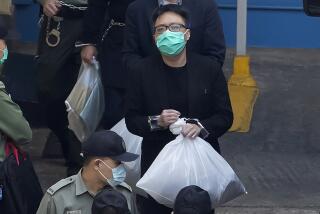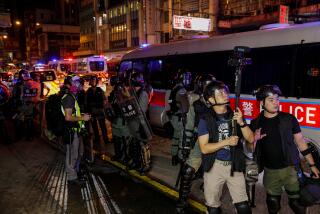China Scholar Gets 13 Years, Activists Say
- Share via
BEIJING — Chinese authorities have sentenced a Hong Kong-based historian to 13 years in prison, according to a human rights group, in the harshest sentence meted out to any of a group of academics arrested in a crackdown on alleged spying.
A municipal court in the Shenzhen Special Economic Zone, which borders Hong Kong, sentenced Xu Zerong on Tuesday for providing classified historical documents to unspecified overseas parties, according to the Hong Kong-based Information Center for Human Rights and Democracy.
Three years of the sentence were for illegally selling books on the mainland, where many Hong Kong publications with political content are banned. Xu, 46, plans to appeal the verdict to a provincial court, the center said Saturday.
The documents apparently pertained to Chinese military operations during the Korean War and to how the Communist leadership decided to enter the conflict in 1950.
Korean War Files
Although some U.S.-based Chinese scholars have obtained copies of important Korean War-related materials, the subject remains highly sensitive in China, and even official academics’ access to such documents is severely restricted. In recent years, North Korean diplomats have protested Chinese scholarly articles that have bucked the party line by claiming that the Communists started the war.
Before his detention in August 2000, Xu, a permanent Hong Kong resident, was an associate research professor at the Guangdong Provincial Academy of Social Sciences and an affiliated professor at Zhongshan University, where his mother is believed to have been president for a time.
He “had a gift of foresight, and he was bolder than most mainland foreign students,” said Byron Weng, a political scientist who was among Xu’s professors at Chinese University of Hong Kong. “He started research into political topics very soon after China began its reform and opening policies.”
Known in English as David Tsui, Xu earned his master’s degree at Chinese University and also studied at Harvard. He received his doctorate in 1999 at Oxford University in England, where his dissertation was on the Chinese army’s role in the Korean War.
“His approach to the subject was wholly scholarly; and he used a range of sources in a manner that conformed to the highest academic standards,” Oxford scholars wrote in April to the Chinese ambassador in London, protesting his arrest.
Magazine Launched
After leaving Oxford to return to Hong Kong, Xu founded the Chinese-language Chinese Social Sciences Quarterly to introduce the work of Western scholars to China. The magazine frequently contained articles considered too politically sensitive for mainland publication.
Although U.S. officials have pressured Chinese leaders to release U.S.-based academics, Xu “was not affiliated with any institution that could back him up,” Weng said.
Last year, before visits by Secretary of State Colin L. Powell and President Bush, China convicted and released four other academics who were either U.S. citizens or permanent residents.
In a speech last month in Hong Kong, U.S. Ambassador to China Clark T. Randt Jr. indicated that human rights will be high on Bush’s agenda during his state visit to China this month. Randt specifically mentioned two other detainees with ties to the U.S., both of whom have since been freed. He did not bring up Xu’s case.
More to Read
Sign up for Essential California
The most important California stories and recommendations in your inbox every morning.
You may occasionally receive promotional content from the Los Angeles Times.













